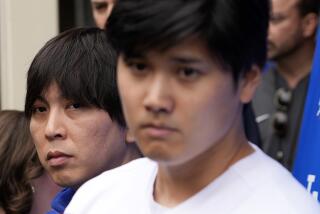Son Tells How Father Helped Jews Flee Nazis
- Share via
Hiroki Sugihara was only 5 when his father, a Japanese diplomat, went against his country’s warnings and issued visas to thousands of Polish Jews, saving them from the Nazis in World War II.
Now, the son has embarked on a tour of the United States and Canada to tell the story of his father, Chiune Sugihara.
“He was a humanitarian,” Sugihara said. “He was aware that he would lose his career, but he said he had to do this, he had to help these people.”
Though his family was shunned for his actions, Chiune Sugihara, who died in 1986, did not regret what he had done, his son said.
Hiroki Sugihara told his father’s story at Chabad of the Valley Tuesday night, his first appearance in Los Angeles.
Chiune Sugihara was the consul general to Lithuania in 1940, when he was asked to issue visas for passage out of the country to more than 6,000 Jews living there, said Chabad Rabbi Menachem Bryski.
“After a long night of soul-searching he woke up the next morning and saw a long line of Jews at the gate,” Bryski said of Chiune.
“He discussed it with his family and he decided to do this. He was told directly by his government not to get involved, but he put everything on the line and he did it nonetheless.”
Sugihara became so obsessed with issuing the visas that he would stay up day and night to fill them out. “He was getting constant warnings from his own government to stop this, until he was literally dragged out of the consulate,” Bryski said.
Even still, Bryski added, “he kept writing the visas as he walked to the train. And when he ran out of printed documents, he wrote them out by hand and he was throwing them to the Jews who had followed him.”
Many of the “Sugihara Survivors” were boys who were away from home and family while attending a yeshiva, or rabbinical school, when the Nazis came to power in Germany.
When it became unsafe in Lithuania, they turned to Sugihara for help.
“Many of those young men went on to become great Jewish leaders,” Bryski said. “Among them was my father, he was a yeshiva boy. So I thought it would be interesting to have his son speak here.”
More to Read
Sign up for Essential California
The most important California stories and recommendations in your inbox every morning.
You may occasionally receive promotional content from the Los Angeles Times.










